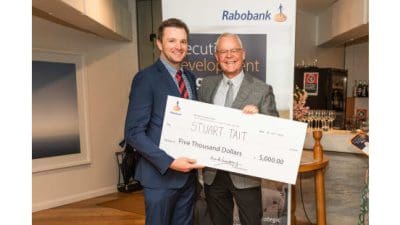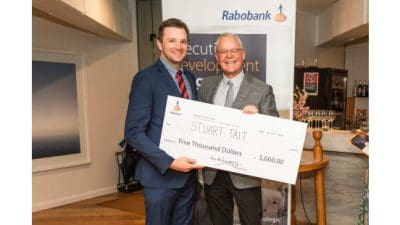
New South Wales combined farmer Stuart Tait has taken out the 2024 Rabobank Enterprise Administration Prize from a discipline of a few of Australia’s and New Zealand’s main farmers.
 An “spectacular marketing strategy that was really entrepreneurial in comprehensively strategising the enlargement alternatives” for his household’s farming enterprise, based mostly close to Mandurama on the NSW Central Tablelands, has earned the progressive younger producer this yr’s Rabobank ‘Dr John Morris’ Enterprise Growth Prize– a prestigious trans-Tasman enterprise prize awarded yearly as a part of the Rabobank Govt Growth Program (EDP).
An “spectacular marketing strategy that was really entrepreneurial in comprehensively strategising the enlargement alternatives” for his household’s farming enterprise, based mostly close to Mandurama on the NSW Central Tablelands, has earned the progressive younger producer this yr’s Rabobank ‘Dr John Morris’ Enterprise Growth Prize– a prestigious trans-Tasman enterprise prize awarded yearly as a part of the Rabobank Govt Growth Program (EDP).
The plan – which Mr Tait developed as a administration mission whereas enterprise the EDP – explores enterprise enlargement alternatives through the on-farm growth of the small-scale modular manufacturing of nitrogenous fertiliser.
The Rabobank Govt Growth Program is a course developed for farmers seeking to construct strategic planning capabilities and industrial administration abilities to discover choices for enterprise progress, run as two modules over an 11-month interval. This system covers matters together with formulating and implementing long-term methods, enterprise planning together with understanding market situations and utilizing sound enterprise logic for aim setting and resolution making, in addition to growing management abilities to run rising enterprises – all whereas growing a powerful community of progressive farmers.
Following the completion of the primary module of the EDP in 2023, Mr Tait undertook a assessment of the manufacturing and monetary efficiency of his enterprise, Tait Agriculture, to find out areas for enchancment, in addition to exploring potential enlargement alternatives.
Blue sky considering
Mr Tait stated the assessment of his beef cattle breeding and buying and selling, and dryland winter cropping, enterprise prompted him to look at inner productiveness ranges and enlargement potentialities.
“The enterprise is eager to proceed to increase its farming operations inside a 50 kilometre radius of Mandurama,” he stated, “nevertheless regardless of enhancements to productiveness, profitability remained difficult, primarily as a result of excessive asset worth of native farmland.
“On condition that enlargement via property buy was not seen as a viable possibility, the door was opened to blue sky considering for enterprise progress.”
Mr Tait stated on-farm fertiliser manufacturing was recognized as an enlargement alternative inside his farm’s current footprint.
“Small-scale modular manufacturing of nitrogenous fertiliser on-farm introduced a progress alternative for the enterprise and likewise addressed quite a few crucial trade points – fertiliser market volatility, CO2 emissions and utilising residue straw/crop,” he stated.
“As a consequence of lowered home provide of fertiliser and an elevated reliance on international provide chains, the provision and value of fertiliser has turn out to be more and more risky, inserting further pressure on farming companies to obtain product at appropriate costs.
“And utilising straw/crop residues presents each an a variety of benefits and challenges to broadacre farming methods. While offering soil well being advantages when it comes to moisture retention and minimising erosion, stubble additionally acts as a bunch for a spread of pests, in addition to being a bodily obstacle for the institution of the next crop. The breakdown and oxidisation of straw, both via deliberate burning or in retained stubble methods, is a big supply of carbon emissions on farm.”
Mr Tait stated the idea of on-farm modular fertiliser manufacturing doubtlessly addresses these points, through the use of the waste straw, eradicating it as a bodily obstacle and supply of emissions, and utilizing it to supply a carbon impartial fertiliser with a manageable provide chain.
The following horizon
Tait Agriculture has just lately entered right into a partnership with HydGene Renewables – an Australian hydrogen expertise startup, engaged on engineering options to remodel biomass into merchandise – to start a field-pilot program from subsequent yr.
“We’re working in the direction of finishing a techno-economic feasibility research by September this yr,” Mr Tait stated. “And can undertake pilot applications via 2025 and into 2026.
“The final word aim is to develop a modular, localised urea-manufacturing course of from waste straw.”
Mr Tait stated he was searching for authorities grants to help in masking the capital prices of the pilot applications.
Key learnings
Mr Tait, a former Nuffield scholar, first learnt in regards to the Rabobank EDP through the long-term Nuffield/Rabobank partnership.
“Nuffield supply quite a few ‘post-grad’ studying alternatives to former students – Rabobank’s EDP is a kind of alternatives,” he stated. “This system content material has been the right match for me – offering the instruments and data I used to be searching for at this level in my profession.
“The periods on strategic implementation had been notably worthwhile. Studying how one can implement a enterprise technique on the bottom and stopping to plan has been extremely helpful.
“One other spotlight was the chance to be taught and community with a gaggle of excellent farmers.”
Spectacular on a number of ranges
With seven EDP members presenting their enterprise plans for the Rabobank ‘Dr John Morris’ Enterprise Growth Prize’, program director Robin Stonecash stated Mr Tait’s mission confirmed he utilized the instruments and frameworks from the EDP to rethink the enterprise and set himself up for achievement.
“Stuart’s mission went nicely past the standard progress plans for farm enlargement. He used the ideas of long-term planning and blue sky considering to unravel an issue widespread to most farm companies,” she stated.
Dr Stonecash stated Mr Tait developed a powerful enterprise case, spoke about what would allow the mission to succeed and what potential roadblocks could be, all with a watch on the environmental advantages of the scheme. “It really is an impressive instance of how farmers will be innovators in addition to robust farm operators. I stay up for watching his enterprise develop,” she stated.
James Greenacre from Rosemount Agriculture close to Cressy in Northern Tasmania was introduced Individuals’s Alternative Winner due to his profitable technique to extend profitability inside his 1300-head dairy enterprise via benchmarking, technical manufacturing efficiencies and investing in systemising the enterprise. Mr Greenacre’s mission was additionally recognised with a Extremely Counseled award from the judges.
Now in its twenty fifth yr, greater than 850 Australian and New Zealand farmers have graduated from this system.
Supply: Rabobank
Trending Merchandise










